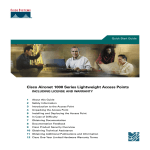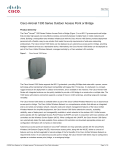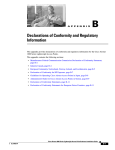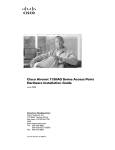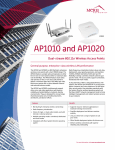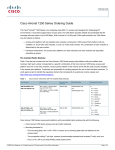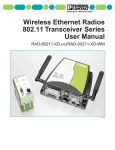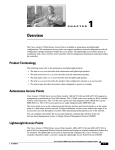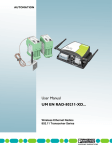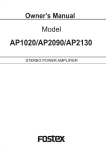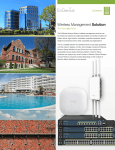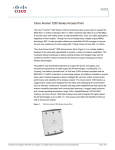Download Cisco 1000 Series 802.11a/b/g AP w/Int Ant and RP-TNC, Israel cnfg
Transcript
Data Sheet Cisco Aironet 1000 Series Lightweight Access Points Cisco Aironet 1000 Series Lightweight Access Points provide industry-leading RF capabilities with the widest breadth of deployment options for maximum wireless LAN performance, security, reliability, and ease of use. This makes the Cisco wireless LAN solution ideally suited for any enterprise environment. Figure 1. Cisco Aironet 1000 Series Lightweight Access Points ® Cisco Aironet 1000 Series lightweight access points are specifically designed for operation with Cisco Wireless LAN Controllers and the Wireless Control System management tool. They provide dual band support for both 802.11a, 802.11b and 802.11g, simultaneous air monitoring for dynamic, real time RF management. In addition, Cisco Aironet 1000 Series Lightweight Access Points handle time-sensitive functions, such as Layer 2 encryption, that enable Cisco wireless LANs to securely support voice, video, and data applications (Figure 2). Figure 2. Enterprise-Wide RF Intelligence All contents are Copyright © 1992–2006 Cisco Systems, Inc. All rights reserved. This document is Cisco Public Information. Page 1 of 9 Data Sheet Cisco Aironet 1000 Series Lightweight Access Points combine simultaneous data forwarding and air monitoring functions eliminating the need for additional dedicated monitoring nodes and thereby reducing the cost of operating wireless networks. This simplifies network design and deployment and maximizes RF security by extending real-time monitoring to every corner of a wireless infrastructure (Figure 3). Figure 3. Integrated Air Monitoring and Data Services All contents are Copyright © 1992–2006 Cisco Systems, Inc. All rights reserved. This document is Cisco Public Information. Page 2 of 9 Data Sheet Flexible Deployment Options Cisco Aironet 1000 Series Lightweight Access Points come equipped with internal 2.4 and 5GHz radios and sectorized antennas, with the 1020 and 1030 models supporting RP-TNC connectors to connect optional external antennas. Cisco Aironet 1000 Series Lightweight Access Points are also available with a single 2.4 GHz radio, for installations where 5 GHz is not allowed due to regulatory restrictions. Multimode 802.11 a/b/g access points provide maximum deployment flexibility and investment protection. In addition, all models are UL 2043 rated to accommodate nearly all building deployment scenarios, such as installation in plenum air spaces. These devices support IEEE 802.3af Power over Ethernet (PoE) and auto MDI/MDIX, and offer standards-based, “over the air” quality of service (QoS), providing additional deployment flexibility. Using the Lightweight Access Point Protocol (LWAPP), Cisco lightweight access points can automatically detect the best available Cisco wireless LAN controller and download appropriate policies and configuration information with no hands-on intervention. The Cisco Aironet 1000 Series consists of three access points each featuring dual 2.4 and 5 GHz radios supporting 802.11a, 802.11b and 802.11g. In addition it is available with a single 2.4 GHz radio that supports 802.11g and 802.11b, for installations where 5 GHz is not allowed due to regulatory restrictions. All interoperate with Cisco Wireless LAN Controllers and the Wireless Control System management tool. Each are optimized for different application scenarios: The AP1010 features dual integrated sector antennas. It’s designed for offices and similar environments providing easy deployment and a predictable coverage pattern. The AP1020 features both integrated sector antennas and an RP-TNC connector for external antennas. By selecting from a wide range of Cisco antennas, customers can achieve a variety of coverage shapes and sizes. Designed for more challenging RF environments, the AP1020 provides a high degree of installation flexibility. All contents are Copyright © 1992–2006 Cisco Systems, Inc. All rights reserved. This document is Cisco Public Information. Page 3 of 9 Data Sheet The AP1030 features both integrated sector antennas and an RP-TNC connector for external antennas and an expanded set of software features designed for a variety of specific applications. ● Remote Edge Access Point (REAP) capabilities allow the AP1030 to be deployed remotely from the wireless LAN controller making it ideal for branch office and small retail locations. The AP1030 delivers the same LAN security, performance, and RF management capabilities as the AP1010 and 1020 and can operate via most standard WAN technologies, including T1, Frame Relay, ATM, DSL, ISDN, and switched 56k. These capabilities enable IT managers to centrally control SSIDs, security parameters, and software loads for unified, enterprise wide wireless LAN services. ● Wireless backhaul capabilities are ideal for applications where an access point is deployed in a location where access to Ethernet is either impossible or impractical. With the AP1030, customers can configure either of the internal radios as a wireless uplink which associates directly with a traditional (root) access point with a wired uplink. Wireless backhaul capabilities are ideal for applications including factories, warehouses, aircraft and dirigible hangers and relatively small outdoor deployments. ● Point-to-Point and Point-to-Multipoint bridging functionality is supported. With this application, each Cisco 1030 Access Point’s Ethernet interface is plugged into a wired network while either the 2.4 or 5GHz RF interface associates wirelessly and joins the networks into a single managed domain*. With optional external antennas ranges of up to one mile (1.6 kilometers), the AP1030 is often an inexpensive alternative to cables and T-1 lines for joining permanent and temporary campus facilities together. Note: The Cisco Aironet 1000 Series Lightweight Access Point with a single 2.4 GHz radio does not support bridging functionality. Applications Designed for enterprise environments and deployments that require coverage flexibility, specific models of Cisco Aironet 1000 Series Lightweight Access Points feature multiple antenna, range, and installation options. A university campus, for example, may place wireless LANs in classrooms using Cisco 1010 lightweight access points. For auditoriums and common areas, Cisco 1020 lightweight access points would be deployed with higher gain external antennas for extended range or specialized coverage patterns In larger enterprise wireless LAN deployments with many access points, IT staff can easily perform software upgrades to Cisco Aironet 1000 Series Lightweight Access Points. Changes are automatically pushed to all access points from Cisco wireless LAN controllers, providing smooth and cost-effective upgrades and helping to ensure that new wireless standards can be supported with no hands-on intervention of the access point. This capability also helps ensure interoperability throughout the network—software automatically remains consistent across the entire Cisco wireless LAN system. All contents are Copyright © 1992–2006 Cisco Systems, Inc. All rights reserved. This document is Cisco Public Information. Page 4 of 9 Data Sheet Features and Benefits Table 1 lists the features and benefits of Cisco Aironet 1000 Series Lightweight Access Points. Table 1. Features and Benefits of Cisco Aironet 1000 Series Lightweight Access Points Feature Benefit Standards-Based LWAPP ● Helps ensure secure communication between lightweight access points and wireless LAN controllers ● Future proof WLAN investment Zero-Touch Configuration and Management ● Reduces the cost and time to deploy a wireless network ● Dramatically simplifies day-to-day operations Simultaneous Air Monitoring and Data Service ● Minimizes equipment requirements ● Simplifies network design ● Increases security through complete real-time monitoring across an entire network Internal and External Antenna Options ● Provides flexible deployment and redeployment options Security ● Works with existing and planned security policies ● Intrusion prevention helps ensure that a neighboring business or malicious user cannot hack into the wireless network ● Detects and contains rogue access points QoS ● Provides effective resource management of the air space Summary Cisco Aironet 1000 Series Lightweight Access Points are ideal for enterprise deployments. Dual 802.11a and 802.11b/g radios and integrated antennas provide flexibility for users to meet the performance requirements of the most demanding applications, while security and management capabilities provide uncompromised support for interoperable IEEE 80211i security and ease of deployment. Cisco Aironet 1000 Series Lightweight Access Points are available with a single 2.4 GHz radio, for installations where 5 GHz is not allowed due to regulatory restrictions. The Cisco 1010 provides integrated antennas to simplify deployments. The Cisco 1020 features RP-TNC antenna connectors for extended range coverage versatility using a broad range of optional external antennas. The Cisco 1030 is the ideal solution for linking remote sites or remote offices which are connected to centralized WLAN controllers. For enterprise environments, the Cisco Aironet 1000 Series Lightweight Access Points are the industry leading access point for secure, scalable, enterprise-class wireless LANs. Product Specifications Table 2 lists the product specifications for Cisco Aironet 1000 Series Lightweight Access Points. Table 2. Product Specifications for Cisco Aironet 1000 Series Lightweight Access Points Item Data Rates Supported Specification ● 802.11a: 6, 9, 12, 18, 24, 36, 48, and 54 Mbps ● 802.11b: 1, 2, 5.5, and 11 Mbps ● 802.11g: 1, 2, 5.5, 6, 9, 11, 12, 18, 24, 36, 48, and 54 Mbps Uplink ● Carrier-Sense Multiple Access/Collision Avoidance (CSMA/CA) Frequency Band and Operating Channels ● 802.11a: 5.15 to 5.25 GHz, 5.25 to 5.35 GHz, 5.47 to 5.725, 5.725 to 5.825 GHz ● 802.11b: 2.412 to 2.497 GHz ● 802.11g: 2.412 to 2.497 GHz All contents are Copyright © 1992–2006 Cisco Systems, Inc. All rights reserved. This document is Cisco Public Information. Page 5 of 9 Data Sheet Item Nonoverlapping Channels Specification ● 802.11a: Up to 12 ● 802.11b/g: Up to 3 ● Dependent upon country-specific regulatory approvals Wireless Modulation ● 802.11a: Orthogonal frequency division multiplexing (OFDM) ● 802.11b: Direct sequence spread spectrum (DSSS) ● 802.11g: DSSS and OFDM Receive Sensitivity (Typical) 802.11a: ● –73 dBm at 54 Mbps ● –75 dBm at 48 Mbps ● –80 dBm at 36 Mbps ● –83 dBm at 24 Mbps ● –87 dBm at 18 Mbps ● –89 dBm at 12 Mbps ● –90 dBm at 9 Mbps 802.11b: ● –89 dBm at 11 Mbps ● –91 dBm at 5.5 Mbps ● –92 dBm at 2 Mbps ● –94 dBm at 1 Mbps ● –91 dBm at 6 Mbps 802.11g: ● –73 dBm at 54 Mbps ● –75 dBm at 48 Mbps ● –80 dBm at 36 Mbps ● –84 dBm at 24 Mbps ● –87 dBm at 18 Mbps ● –90 dBm at 12 Mbps ● –89 dBm at 11 Mbps ● –91 dBm at 9 Mbps ● –91 dBm at 6 Mbps ● –91 dBm at 5.5 Mbps ● –92 dBm at 2 Mbps ● –94 dBm at 1 Mbps Available Transmit Power Settings ● 100, 50, 25, 12.5, and 6.25 percent ● 802.11a: 50 mW (17 dBm) conducted ● 802.11b: 100 mW (20 dBm) conducted ● 802.11g: 100 mW (20 dBm) conducted ● Maximum power setting will vary according to channel and individual country regulations Range ● 802.11a ◦ Indoor: 45 ft (14 m) @ 54 Mbps, 110 ft (34 m) @ 18 Mbps, 165 ft (50 m) @ 6 Mbps ◦ Outdoor: 100 ft (30 m) @ 54 Mbps, 600 ft (183 m) @ 18 Mbps, 1000 ft (305 m) @ 6 Mbps ● 802.11b ◦ Indoor: 160 ft (49 m) @ 11 Mbps, 410 ft (125 m) @ 1 Mbps ◦ Outdoor: 1000 ft (305 m) @ 11 Mbps, 2000 ft (610 m) @ 1 Mbps ● 802.11g ◦ Indoor: 90 ft (27 m) @ 54 Mbps, 180 ft (55 m) @ 18 Mbps, 300 ft (91 m) @ 6 Mbps ◦ Outdoor: 250 ft (76 m) @ 54 Mbps, 600 ft (183 m) @ 18 Mbps, 1300 ft (396 m) @ 6 Mbps ● Actual ranges and throughput will vary based on environmental factors Antenna Connectors Integrated Antennas ● AIR-AP1010-x-K9: None ● AIR-AP1020-x-K9 and AIR-AP1030-x-K9: ◦ 802.11a: One male RP-TNC connector ◦ 802.11b/g: Two male RP-TNC connectors ● 1000 series ◦ 802.11a/b/g: Two 180-degree sectorized antennas ◦ 2.4 GHz: Gain 5.5 dBi ◦ 5 GHz: Gain 6 dBi All contents are Copyright © 1992–2006 Cisco Systems, Inc. All rights reserved. This document is Cisco Public Information. Page 6 of 9 Data Sheet Item Specification Compliance Safety: ● UL 60950, Third Edition ● UL 2043 ● EN 50385:2002 ● RSS 102 ● FCC OET 65 Electrical safety: ● UL 60950-1:2003, First Edition ● CSA C22.2 No. 60950-1-03 Radio approvals: ● US: FCC Part 15 subparts C and E ● EN 300 328 V1.4.1 ● EN 301 893 V1.2.3 ● Canada: RSS-210 ● Europe: EN 301.893, EN 300.328 ● Japan: ARIB STD-33A/STD-T66, ARIB STD T-71 ● EN 60601-1-2 EMC requirements for the Medical Directive 93/42/EEC EMI and susceptibility (Class A): ● US: FCC parts 15.107 and 15.109 ● Canada: ICES-003 ● Japan: VCCI ● Europe: EN 55022, EN 55024, EN 301.489-1 and –17 Electromagnetic compatibility (EMC): ● EN 60601-1-2:1993 Class B ● EN 301 489-17 V1.2.1; EN 301 489-1 V1.4.1 ● Subpart B of Part 15 of FCC Rules for Class B digital devices ● Canada ICES 003 1997 Class B ● VCCI Class B ● EN 55022:1994, Class B, as modified by Amendment A1, dated 1995, and Amendment A2, dated 1997 Power supply safety: ● AIR-PWR-1000= ● AIR-PWRINJ-1000AF= ● US, EU, worldwide: UL listed, TUV/GS mark, CE mark, CB scheme, USL/CSL per UL60950 ● Japan PSE Other standards: ● Ethernet IEEE 802.3/IEEE 802.3u ● IEEE 802.3af Power over Ethernet (PoE) Interface and Indicators ● Network: 10/100 Mbps Ethernet (RJ-45 link, activity) ● Other indicators: Power, alarm Dimensions (H x W x D) ● 1000 series Weight ● Access point and ceiling clip: 1.3 lb (0.6 kg) ● Access point with optional wall brackets kit: 2.2 lb (1 kg) Environmental ● Operating: 32 to 122°F (0 to 50°C) ● Operating humidity: 10–95%, non-condensing ◦ 9.6 x 5.7 x 1.6 in. (24.4 x 14.5 x 4.1 cm) ● Storage: –13 to 158°F (–25 to 70°C) ● Storage humidity: up to 95% Power ● 48 VDC; 250 mA; 10W ● Power over Ethernet (IEEE 802.3af) ● Optional AC power supply (AIR-PWR-1000=) Warranty ● One year Wi-Fi Certification ● 802.11a/b/g ● Wi-Fi Protected Access (WPA) and WPA 2: Personal, Enterprise All contents are Copyright © 1992–2006 Cisco Systems, Inc. All rights reserved. This document is Cisco Public Information. Page 7 of 9 Data Sheet Ordering Information Table 3 provides ordering information for Cisco Aironet 1000 Series Lightweight Access Points. To place an order, visit the Cisco Ordering Website. http://www.cisco.com/en/US/ordering/index.shtml Table 3. Product Part Numbers for Cisco Aironet 1000 Series Lightweight Access Points Part Number Product Name AIR-AP1010-A-K9 Cisco Aironet 1000 Series 802.11a/b/g Access Point w/Int Antennas, FCC configuration AIR-AP1020-A-K9 Cisco Aironet 1000 Series 802.11a/b/g Access Point w/Int Antennas and RP-TNC connectors, FCC configuration AIR-AP1030-A-K9 Cisco Aironet 1000 Series 802.11a/b/g Remote Edge Access Point w/Int Antennas and RP-TNC connectors, FCC configuration AIR-AP1010-C-K9 Cisco Aironet 1000 Series 802.11a/b/g Access Point w/Int Antennas, China configuration AIR-AP1020-C-K9 Cisco Aironet 1000 Series 802.11a/b/g Access Point w/Int Antennas and RP-TNC connectors, China configuration AIR-AP1030-C-K9 Cisco Aironet 1000 Series 802.11a/b/g Remote Edge Access Point w/Int Antennas and RP-TNC connectors, China configuration AIR-AP1010-E-K9 Cisco Aironet 1000 Series 802.11a/b/g Access Point w/Int Antennas, ETSI configuration AIR-AP1020-E-K9 Cisco Aironet 1000 Series 802.11a/b/g Access Point w/Int Antennas and RP-TNC connectors, ETSI configuration AIR-AP1030-E-K9 Cisco Aironet 1000 Series 802.11a/b/g Remote Edge Access Point w/Int Antennas and RP-TNC connectors, ETSI configuration AIR-AP1010-J-K9 Cisco Aironet 1000 Series 802.11a/b/g Access Point w/Int Antennas, Japan configuration AIR-AP1020-J-K9 Cisco Aironet 1000 Series 802.11a/b/g Access Point w/Int Antennas and RP-TNC connectors, Japan configuration AIR-AP1030-J-K9 Cisco Aironet 1000 Series 802.11a/b/g Remote Edge Access Point w/Int Antennas and RP-TNC connectors, Japan configuration AIR-AP1010-K-K9 Cisco Aironet 1000 Series 802.11a/b/g Access Point w/Int Antennas, Korea configuration AIR-AP1020-K-K9 Cisco Aironet 1000 Series 802.11a/b/g Access Point w/Int Antennas and RP-TNC connectors, Korea configuration AIR-AP1030-K-K9 Cisco Aironet 1000 Series 802.11a/b/g Remote Edge Access Point w/Int Antennas and RP-TNC connectors, Korea configuration AIR-AP1010-N-K9 Cisco Aironet 1000 Series 802.11a/b/g Access Point w/Int Antennas, N = North America (excluding FCC) configuration AIR-AP1020-N-K9 Cisco Aironet 1000 Series 802.11a/b/g Access Point w/Int Antennas and RP-TNC connectors, N = North America (excluding FCC) configuration AIR-AP1030-N-K9 Cisco Aironet 1000 Series 802.11a/b/g Remote Edge Access Point w/Int Antennas and RP-TNC connectors, N = North America (excluding FCC) configuration AIR-AP1010-P-K9 Cisco Aironet 1000 Series 802.11a/b/g Access Point w/Int Antennas, Japan2 configuration AIR-AP1020-P-K9 Cisco Aironet 1000 Series 802.11a/b/g Access Point w/Int Antennas and RP-TNC connectors, Japan2 configuration AIR-AP1030-P-K9 Cisco Aironet 1000 Series 802.11a/b/g Remote Edge Access Point w/Int Antennas and RP-TNC connectors, Japan2 configuration AIR-AP1010-R-K9 Cisco Aironet 1000 Series 802.11b/g Access Point w/Int Antennas, 2.4 GHz only AIR-AP1020-R-K9 Cisco Aironet 1000 Series 802.11b/g Access Point w/Int Antennas and RP-TNC connectors, 2.4 GHz only AIR-AP1030-R-K9 Cisco Aironet 1000 Series 802.11 b/g Remote Edge Access Point w/Int Antennas and RP-TNC connectors, 2.4 GHz only AIR-AP1010-T-K9 Cisco Aironet 1000 Series 802.11a/b/g Access Point w/Int Antennas, Taiwan configuration AIR-AP1020-T-K9 Cisco Aironet 1000 Series 802.11a/b/g Access Point w/Int Antennas and RP-TNC connectors, Taiwan configuration AIR-AP1030-T-K9 Cisco Aironet 1000 Series 802.11a/b/g Remote Edge Access Point w/Int Antennas and RP-TNC connectors, Taiwan configuration AIR-PWR-1000= Power supply for Cisco Aironet 1000 Series Lightweight Access Points AIR-ACCWBRKT1000= Cisco Aironet 1000 Series wall-mount bracket kit All contents are Copyright © 1992–2006 Cisco Systems, Inc. All rights reserved. This document is Cisco Public Information. Page 8 of 9 Data Sheet Part Number Product Name AIR-ACCCEBZL1000= Cisco Aironet 1000 Series ceiling-mount bezel kit AIR-PWRINJ1000AF= 802.3af power injector for Cisco Aironet 1000 Series Lightweight Access Points Note: 1. Customers deploying access points that are not using Power over Ethernet (PoE) must separately order the power supply (AIR-PWR-1000=) or Cisco 802.3af power injector (AIRPWRINJ-1000AF=) and associated power cord. 2. T-BAR clips for mounting to ceiling tile rails is provided with the 1000 Series. Customers with other deployment requirements should order separately the wall mount kit or ceiling mount bezel kit. 3. Optional external antenna for the Cisco 1020 model and 1030 model lightweight access points are sold separately. Service and Support ® Cisco Systems offers a wide range of services programs to accelerate customer success. These innovative services programs are delivered through a unique combination of people, processes, tools, and partners, resulting in high levels of customer satisfaction. Cisco services help you protect your network investment, optimize network operations, and prepare your network for new applications to extend network intelligence and the power of your business. For more information about Cisco services, visit Cisco Technical Support Services or Cisco Advanced Services. For More Information For more information about Cisco Aironet 1000 Series Lightweight Access Points, contact your local account representative or visit: http://www.cisco.com/go/wireless Printed in USA All contents are Copyright © 1992–2006 Cisco Systems, Inc. All rights reserved. This document is Cisco Public Information. C78-341653-04 12/06 Page 9 of 9










